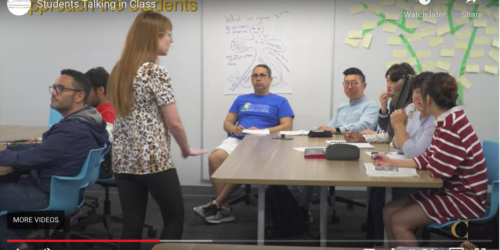Preventing Classroom Management Challenges
How do expert teachers handle classroom management?
The research into expertise in teaching shows that expert teachers do not behave like experts in high-risk professions (e.g., paramedics, fire fighters, policing, etc.) in regards to speed. In high-risk fields, experts analyze the situation quickly, come up with a plan of action, and implement the plan more quickly than novices, in part because novices tend not to know what information to disregard. In teaching, expert teachers recognise the complexity inherent in gathering a group of human beings together, the fact that there is usually no immediate risk, that gathering information about individual’s needs and motivations needs time, and that community can quickly be damaged. Therefore, expert teachers notice potential problems but act much more slowly than novices.
| Novice | Competent | Proficient | Expert/Master | |
| Recall | Non-Situational | Situational | Situational/Contextualized | Situational / Contextualized |
| Recognition of Event Components | Decomposed | Holistic | Holistic | Holistic |
| Decision-Making on Event | Reactive | Analytical | Intuitive | Intuitive Reflective Cautious |
| Awareness of Individual Students and Community Mood | Monitoring | Monitoring | Monitoring | Absorbed |
Let’s begin by examining the gist of the Dreyfus & Dreyfus Expertise Development Model as discussed in Adolpho (2010) which I have adapted to teaching in the table above. I have highlighted the four characteristics seen primarily in expert or master faculty.
Over the last 3 decades many researchers have examined faculty who have expert characteristics to see if advice can be given to novice faculty so that they can engage in intentional and reflective practice. The recent research into expert versus novice teachers is fascinating.
In terms of understanding problematic events in the classroom, Wolff, Jarodzka, & Boshuizen, (2017) determined that “Novice’s interpretations focused on issues of behavior and discipline. Experts were markedly focused on student learning, stressing the influential role of the teacher on events arising in the classroom.” This is important to contemplate in any discussion of classroom management. If we keep our focus on student learning, we can prevent many problematic occurrences from happening.
Students are watching our reactions and assessing our level of attention and care. Many studies have looked at what students “see” in expert versus novice teachers in terms of delivery behaviours. For example, McIntyre, Mainhard, & Klassen (2017), did a study that used eye tracking devices and found that both the amount and type of eye contact that teachers use with students differs on level of expertise. They found that “Expert teachers were shown to use significantly more student gaze and greater gaze efficiency during both attention and communication” (p. 40). This is something I often notice when observing teaching. Novices tend to look over the students heads, generally at the class, or at an object (e.g., the slide, the board, the text) rather than at individual students. Experts seem to want to acknowledge each individual’s presence and contribution.
So what does this all mean to the advice I am going to share? Let’s pretend that on a good day, I am an expert in the classroom. Below are my ways of behaving to avoid and react to classroom management challenges. These practices include an air of appreciative inquiry and camaraderie – qualities of being in the classroom that are hard to share in writing but essential.
I practice two key areas of classroom management:
- prevention of most incidents
- reaction to challenging incidents
The following suggestions and innovations will examine prevention.
Suggestions & Innovations
Predictions
I can predict that:
- I will have a group of 20, 30 or 40 more individuals forced into community by the program design.
- Some days students are overwhelmed by just having left a test or by having an upcoming assignment due.
- Their lives are even more challenging than mine in some ways. They are juggling their lives and 5-6 different courses.
- They will be watching me and analyzing how I react to various “tests” from the group. How do I respond to questions such as, “Is this on the exam?” or “Why did we lose marks on X?” or “Can we leave early and have no break?”
- They will be watching how I respond to unwanted behaviours such as cross-talking over my delivery or the delivery of a peer, not being on task, distracting others, making noise during late entry, etc.
- They will hold a collective breath when one of their own crosses the line into incivility or risk. They will be asking themselves, “How will Kathryn respond?” If they respect me they will be hopeful. If I have not earned respect, they may be gleeful. They will also feel keenly for their classmate in one of the same two veins: hope or glee.
Knowing these things, I work hard to prepare a lesson that will require the students to be working harder than me in class time.
I will be strategic with input and ensure mini tasks so I can circulate and coach, changing up the rhythm every 10-20 minutes. I will debrief every task and tie the learning of new knowledge, skills, and attitudes (KSA) into how they will be assessed for the learning of the course outcomes and ensure they also see WIIIFM (What Is In It For Me) with regards to the future of the program and beyond. No class will ever be about me and my subject matter expertise (SME). I exist only because of the students who need to learn.
I will also notice and codify types of student behaviour. Many are absolutely predictable. Expert teachers have been shown to notice escalating behaviour more quickly but to act much more slowly (Honkasilta, Vehkakoski, & Vehmas, 2016). After all, in my class, I have many ways to react and most don’t require a public calling out.
Leverage Rules
I have three rules for the class stated at the start of the semester and reinforced throughout. They have served me well for at least 20 years now. They all, fundamentally relate to respect. They are
- No one talks when I am talking.
- No one talks when a colleague is talking to me or to the class.
- Everyone is on task unless I have been notified in advance or provided with an explanation as we start.
I also have 3 rules for myself:
- Know or have access to each student’s name at all times. I affirm students by name. I divide the class into sections and ask questions of ever-narrowing groups so I can use all student’s names within a few classes. I don’t ask the whole class questions, as if all are responsible then no one is. I only ask individuals if they have given me the facial, gesture, and body language cues that they want that attention.
- Be present and on task. I have a plan for the flow of the lesson and materials to support the flow (e.g., PowerPoint slides with questions for me to ask or students to ask me, visuals to stimulate open discussion, tasks that are individual or student-to-student or student(s)-to-class so I am never the sage on the stage for an entire session. When students are practicing, I have arranged small groups of 3-4 so the noise level and sight lines can work. I have accounted for accessibility. I am circulating and coaching and providing feedback. I always bring the class back together before the end so we are debriefing in community and looking forward to next steps.
- Honour each student: I accept responsibility for each fellow human who is on my class list. They are each meant to be there and I am happy they are there even if they will force me to grow when I would rather coast. I reach out if anyone appears at risk. I celebrate successes, laud effort, reward attainment of the course outcomes with commensurate marks, and feel sadness when we lose someone or someone is sad or someone needs to repeat. This is one of my communities for the semester. I care.
These are deliberately rules, rather than a group consensus or “contract,” as I believe that I have a duty to manage the classroom. You may prefer a different approach. There are many paths to the same end. All of the successful paths seem to share one common thread – respect. Let’s work together when we hear stories of student behaviour to inquire respectfully about what occurred and what can occur differently next time.
Once all of this is in place and something untoward occurs, then I:
Buy Time
Time is on my side. There is nothing as poignant as a good long pause. Unlike firefighters, time is not an issue. I can delay responding in most cases. In the case of a severe challenge, such as a student swearing directly at me, I can pause and then say, “Let’s take an early (or extra) break. Let (student name) and I have a chat and we will start again in 10 minutes.” Whatever you do, do not make a public show of the incident.
Document Concerning Incidents
My own ego can be on hold, but the students need to be respected and protected. If a student makes a comment that could cause pain to other students, I say, “I am sorry. I can’t accept that type of comment. I will send you an email after class telling you why.” Now, I have inserted follow-up and documentation very smoothly into the incident thus likely de-escalating it quickly.
Create Community
I don’t want to introduce any unnecessary antagonism between students themselves or between me and a student. I don’t want to blame. Honkasilta et al (2016) examined student reactions to how teachers manage incidents and suggest that
“Students and teachers positing each other as the antagonists of stories of classroom management by invoking sociocultural role and norm expectations do not bring about solutions for classroom management; on the contrary, this only strengthens the culture of blame.”
Honkasilta et al (2016)
Reflect
One of my most influential teachers was David J. Mendelsohn who taught Linguistics at the University of Toronto when I did my TESL Certificate. He said that there were seven deadly sins of teaching with the foremost being
“Failing to love and respect our students.”
Many times when I question my own behaviours in class or consult on incidents, I hear his words.
References
Adolfo, P. (2010). The Dreyfus model of clinical problem-solving skills acquisition: a critical perspective. Medical Education Online, Vol 15, Iss 0, Pp 1-11 (2010), (0), 1.
Hambrick, D. Z., Altmann, E. M., Oswald, F. L., Meinz, E. J., Gobet, F., & Campitelli, G. (2014). Accounting for expert performance: The devil is in the details. Intelligence, 45(Acquiring Expertise: Ability, Practice, and Other Influences), 112-114.
Honkasilta, J., Vehkakoski, T., & Vehmas, S. (2016). ‘The teacher almost made me cry’ Narrative analysis of teachers’ reactive classroom management strategies as reported by students diagnosed with ADHD. Teaching And Teacher Education, 55100-109.
McIntyre, N. A., Mainhard, M. T., & Klassen, R. M. (2017). Are you looking to teach? Cultural, temporal and dynamic insights into expert teacher gaze. Learning And Instruction, 49 41-53.
Wolff, C. E., Jarodzka, H., & Boshuizen, H. P. (2017). See and tell: Differences between expert and novice teachers’ interpretations of problematic classroom management events. Teaching And Teacher Education, 66 295-308.



